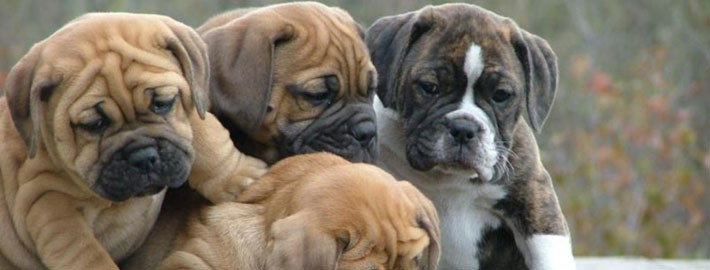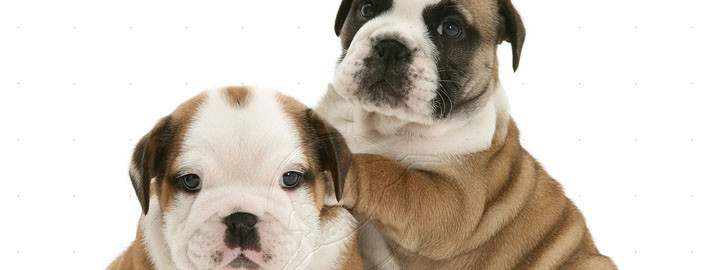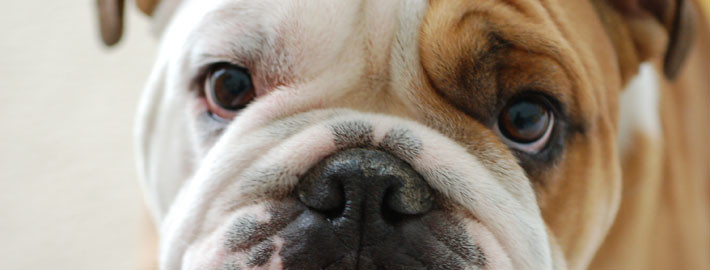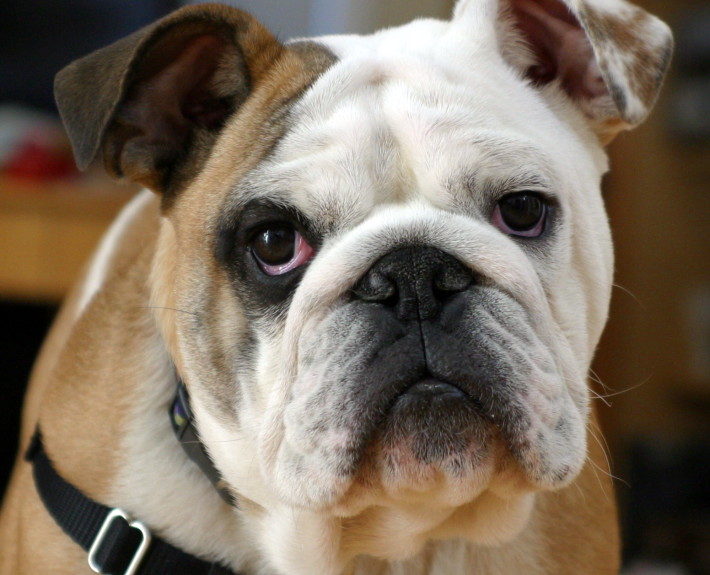What makes the Bulldog Unique?
The bulldog’s heavy, thick-set, low-slung body with wide shoulders gives it a low center of gravity, a vital asset when fighting a large animal. The massive head, of which the circumference should equal at least the height of the dog at the shoulder, gives ample room for muscular attachment for the strong, wide jaws. The undershot bite allows a tight grip, at the same time giving breathing room through the nose. The limbs are sturdy, the gait loose-jointed, shuffling, and rolling — this is not a breed that needs to run! The coat is fine and glossy. Despite its “sourmug,” the bulldog is jovial, comical and amiable, among the most docile and mellow of dogs. It is willing to please, although it retains a stubborn streak. It is very good with children. Most are moderately friendly toward strangers. Although some can be aggressive with strange dogs, the breed is quite good with other pets.
Breed Groups
Page Contents
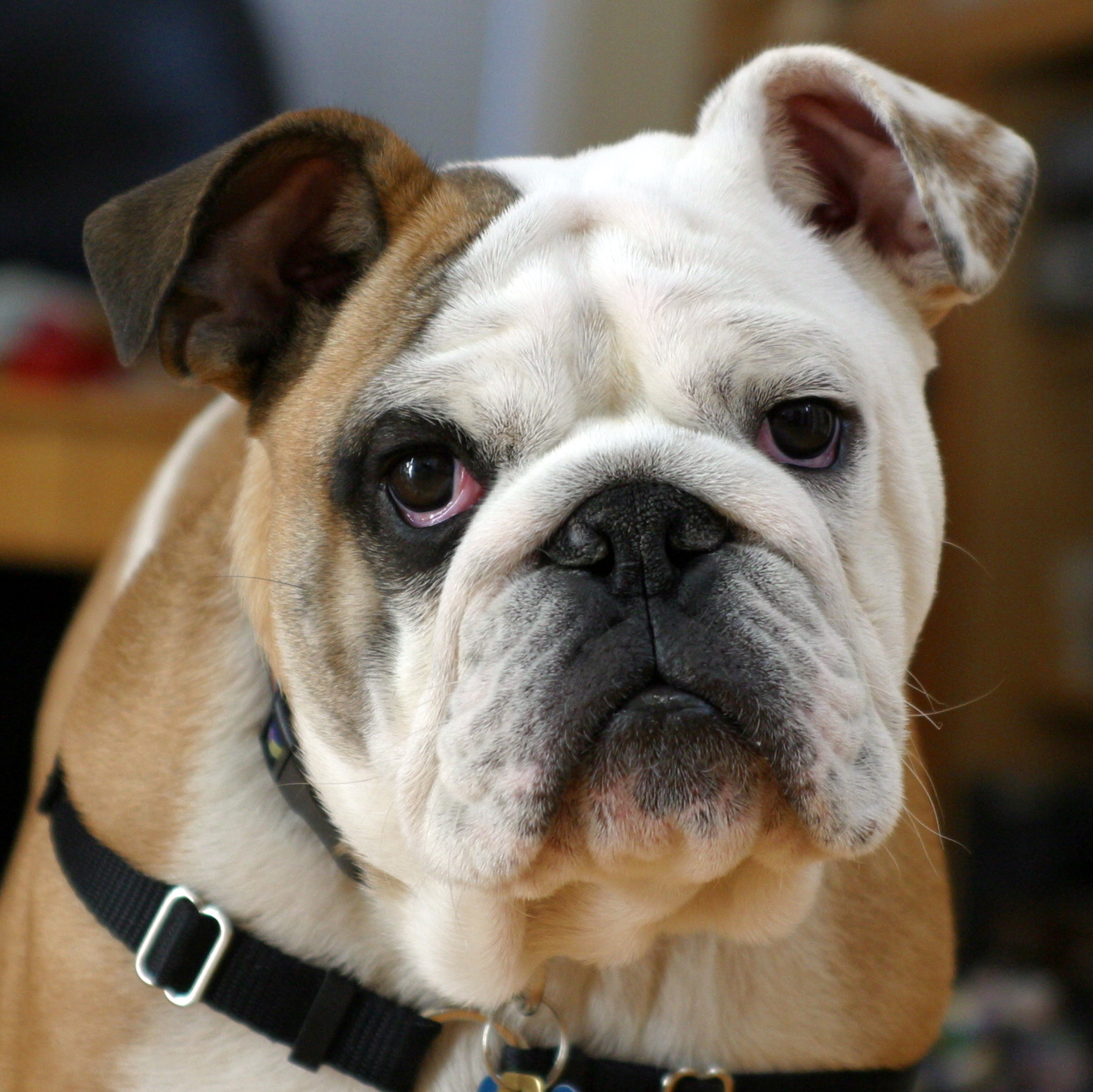
Is the Bulldog Right For You?
The bulldog’s heavy, thick-set, low-slung body with wide shoulders gives it a low center of gravity, a vital asset when fighting a large animal. The massive head, of which the circumference should equal at least the height of the dog at the shoulder, gives ample room for muscular attachment for the strong, wide jaws. Despite its “sourmug,” the bulldog is jovial, comical and amiable, among the most docile and mellow of dogs. It is willing to please, although it retains a stubborn streak. It is very good with children. Most are moderately friendly toward strangers.
In 5 Words
- Friendly
- Easygoing
- Tolerant
- Mellow
- Gregarious
Characteristics
Learn About the Bulldog
Description
The Bulldog is a wide, medium-sized, compact dog with short legs. These are the color of the Bulldog that you can choose from: Brindle or Red, Grey or Black, Solid White, Fawn, Red or Black, w/ or w/o White. It has a 65 lbs. weight or up, and its height is 16 inches and up. This breed has a small tail which low set. The tail is carried low when relaxed. The muzzle is very short and broad; neck is short and thick; nose is large, broad and black; square shaped jaws are broad and massive; eyes are very dark and the rose ears are small, thin and set high.
Short History of the Bulldog
Bulldog is a dog breed commonly referred to as the English Bulldog. But there are other Bulldog breeds that includes the American Bulldog, Olde English Bulldogge, Australian Bulldog and the French Bulldog. Like the pit bull, these bulldog breeds were originally bred to help butchers control livestock, although bulldogs most likely predate pit bills, with a history that can possibly be traced back to the 5th century in England and a breed called the Alaunt. The Bulldog dog breeds, to the best of our knowledge, had its origin in the British Isles. The name “bull” was applied because of the dog’s use in the sport of bull baiting, which was extremely cruel. The original Bulldog had to be very ferocious and so savage and courageous as to be almost insensitive to pain.
Bulldog breeds breed was created, sometime in the 1500s or 1600s, specifically for the purpose of bull-baiting, a cruel so-called “sport” that pitted a dog against a bull for a fight to the death. American Bulldogs are descended from ancient Mastiffs that originated in Asia and were brought to Europe by nomads. Mastiffs were bred to bring down, fight or hold large aggressive prey such as wild boar, bears or big cats.
Temperament
This Bulldog dog breeds are generally gentle, friendly, and adoring, with a mischievous dose of stubbornness. The English Bulldog is incessantly loyal to its family.
Caring for Your Bulldog
General Health
The basic or usual health problem of bulldog is the following.
Eyes:
Cherry Eye
Dry Eye
Conjunctivitis
Ears:
Dirty / Infected ears
Closed ears
Ear Mites
Nose:
Inverted sneezing
Dry Nose
Throat:
Elongated Soft Palate and other airway disorders
Sleep Apnea
Head:
Head Shakes
Tear Stains
Sore Wrinkles
Body:
Itchy skin
Baldness
Mange
Development Problems
OCD and Hip Displacia
CRUCIATE LIGAMENT DAMAGE
Feet:
Interdigital Cysts
For the complete list of bulldogs health issues. It is very important that nails are kept short either through regular road walking or clipping. Nails that are left to grow too long are uncomfortable for the dog and it may be painful for him to walk. Be aware that cutting long front nails may encourage interdigital cysts as the pressure on the feet is altered.
Tail:
A true bulldog tail is a dream to look after, ideally he should have a nice straight spiked tail, moderate in length, that can be easily lifted away from the body – however, screw tails in bulldogs are not uncommon (many people assume the bulldog should have a screw tail which is not correct) and this and/or an inverted tail (where the tail is growing back into the body) can cause your bulldog a few problems.
General Problems
UTI’s and Cystitis
Vets
Grooming & Bathing
Coat care is minimal, but facial wrinkles (and any folds around the tail) should be cleaned daily.
Exercise & Training
The bulldog appreciates a daily outing but cannot tolerate hot humid weather. It should not be expected to jog or walk great distances, or to jump from any heights. Most bulldogs cannot swim. Most bulldogs wheeze and snore, and some drool.

